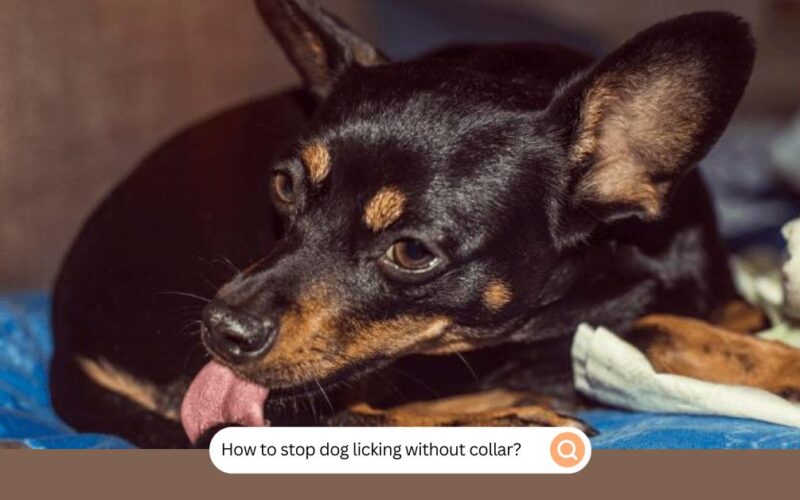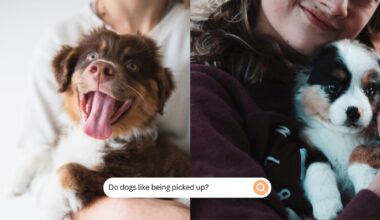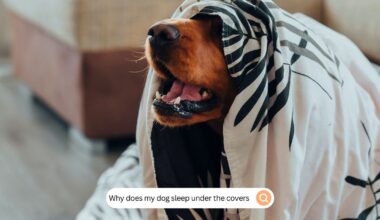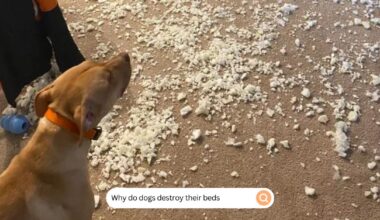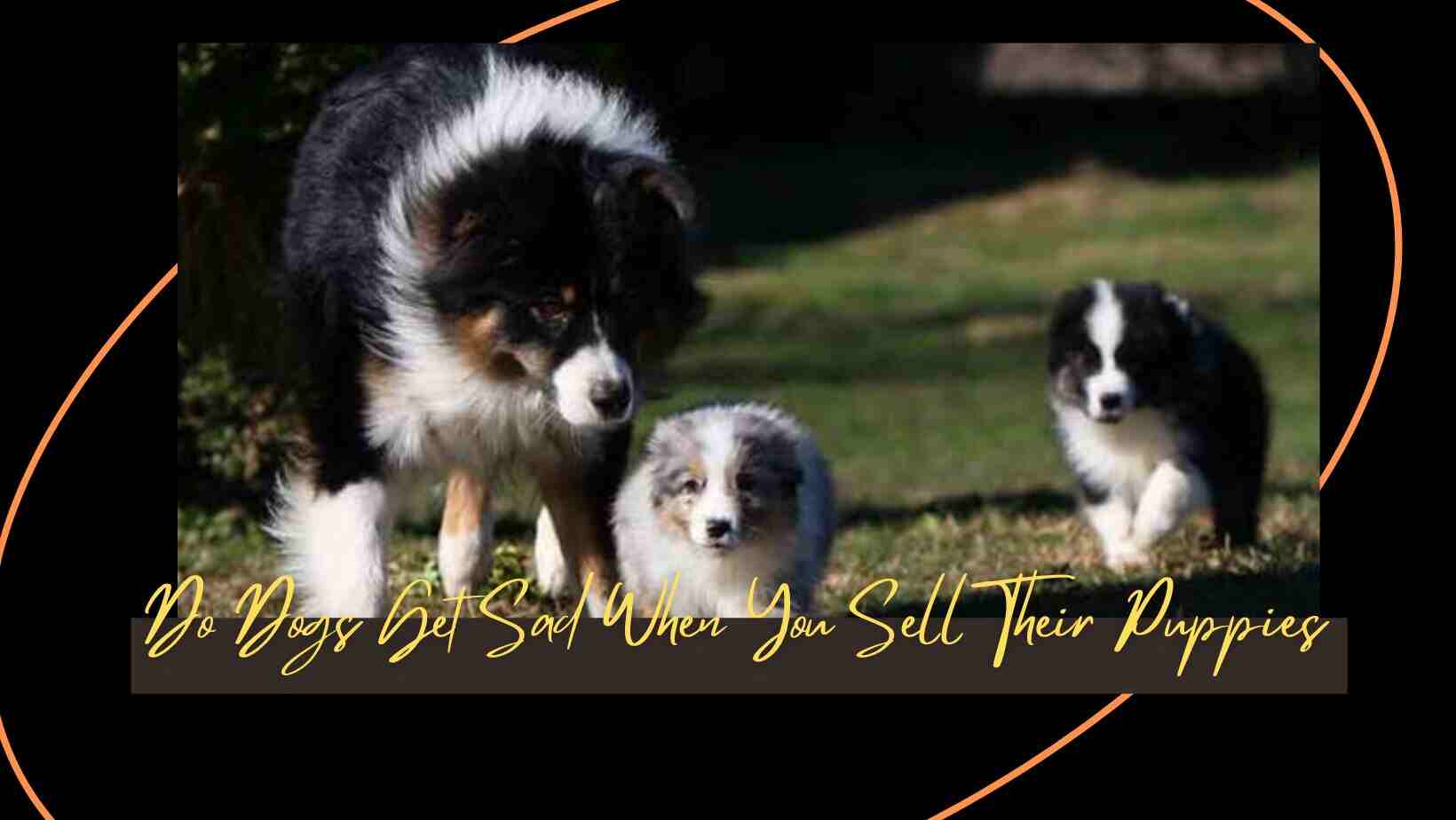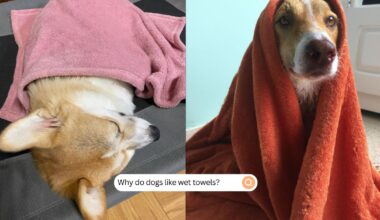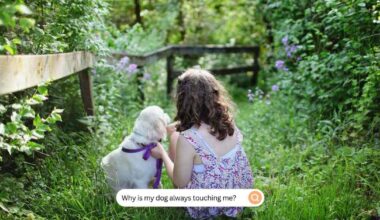About the Author: Emma loves to have dogs as her pets and with so much knowledge about dogs, she started MyPetDoggie.com to share it with other dog lovers and parents. She is a Pet Specialist and Pet Behavior Analyst, who studied at the University of South Dakota.
If your dog has recently undergone surgery or has become wounded somehow, there are many chances it will start licking that wound. This could be very frustrating as due to excessive licking, no ointment can stay on your dog’s injury for a long time.
As a result, the wound, which can be cured in three to four days, will take up to a month to completely heal. Not only will it delay healing, but it also increases the chances of infections.
While professionals will prescribe using dog collars or cones to prevent this, they can result in depressing your wounded dog as they are uncomfortable and bulky.
Thus, I have listed tips and tricks on how to stop dog licking without collar. Also, I have mentioned some home remedies that can also be tested.
How To Stop Dog Licking Without Collar
Instead of using a collar or cone, you can do it by covering the wound with a bandage/soft fabric using medical tape and then applying a fine mist of “no lick” spray. Later you can use distractable toys such as chew toys to further prevent them from licking wounds.
Many alternatives to dog collars can be used to stop your dog from licking. But which method will be effective depends on your dog’s reaction to each technique.
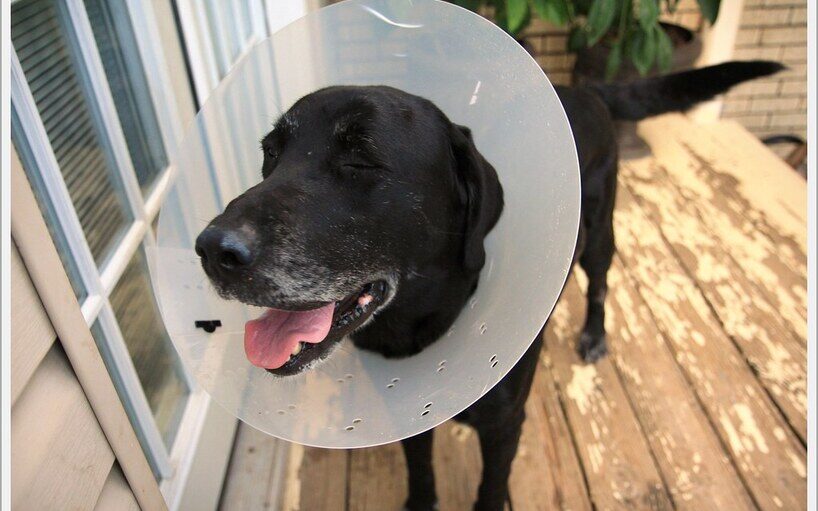
So, you must remain patient and keep trying until you find the best alternative.
Supervision:
Supervising your dog all the time is not easy, but you can keep an eye on it most of the time and punish it every time it licks the wound. If your dog is intelligent and a good picker, it will soon learn not to lick the wound. This technique demands a lot of effort from the owner, but if you love your pet, anyone can do this for their dog.
Distraction:
Another simple trick is just to keep your dog busy and distracted. This will keep your dog’s mind from the wound and reduce licking. You can distract your dog in several ways. For example, playing with it or giving it soft toys that he can chew. Also, you can try the slow feeding technique. Just replace your dog’s regular meal with split portions and feed it at different intervals. However, it may disturb your dog a little but will keep it distracted for a long time.
Positive Reinforcement:
You can also use positive reinforcements to change your dog’s habits. This will stop it from licking without hurting or depressing him. Whenever you see it licking the wound, stop it. Give him a treat or his favorite toy as soon as it stops. You can also pet him to comfort him. This will distract him from licking and develop a stronger bond between you and your dog.
Bandaging:
Although bandaging will not stop your dog from licking, it will protect your dog’s wound and prevent it from infection. You can also apply the prescribed ointment and then put on the bandage for better healing. But make sure not to use a bandage too tightly, as wounds need airflow to heal. Also, remember to change the bandage two to three times a day.
One problem with bandages is that your dog may also chew them away. So, in case your dog loves chewing everything, something other than this idea will work on it.
E-Collar Alternative:
People often use e-collars for training their dogs, but it can be uncomfortable and painful for your already injured dog. You will never want to do this. So, e-collar alternatives like soft cones and bodysuits can be used. These are not painful; they also keep your dog comfortable and stop it from licking its wound.
Behavioral Training:
Behavioral training can be slow but can prove compelling and long-lasting. Try starting step by step with a single command and make your dog understand that licking the wound is not a good thing. Do this either by giving it treats or by punishing it for licking. This may not work the first time, but continue this training every time it gets a wound. Soon, your problem will be solved, and you will get rid of it forever.
Regular Cleaning:
If you cannot train your dog not to lick the wound, clean it three to four times a day and apply ointment, even if your dog licks it away again. Try to keep the damage clean as much as possible. This will reduce the chances of infection. Moreover, if the wound is kept clean and the dog stops feeling irritated by that wound, there are chances that it will also stop licking the wound soon.
Consult Your Veterinarian:
After trying every method, if your dog still has not stopped licking the wound, the last hope is your veterinarian. Consult your vet and ask for his advice about what to do in this situation. He will prescribe some good ointments that work fast and any other method to stop your dog from licking the wound.
Cone Alternatives To Stop Dog Licking Wound
Along with dog collars, another popular thing that vets recommend to stop dog licking is using cons. But like collars, they are also very uncomfortable. Their plastic material can cause rashes on the dog’s neck.

So here are some alternatives that you can use instead of cones.
Inflatable Collars:
These collars are very much similar to hospital pillows. They are made of soft, light materials that do not disturb the dog and prevent discomfort. It is straightforward to use. Put it around your dog’s neck, and you are all done. This inflatable collar will limit the dog’s head movements. Thus, your dog will not be able to reach the wounded site and, as a result, will stop licking.

Neck Braces:
Another alternative to plastic cones is dog neck braces. They are similar to human neck braces, having a hard outer covering but are soft and padded from the inside. They prevent the dog’s neck from bending down while allowing only side movements of the head. Neck braces are designed not to suffocate your dog and prevent it from wound licking in a good way.
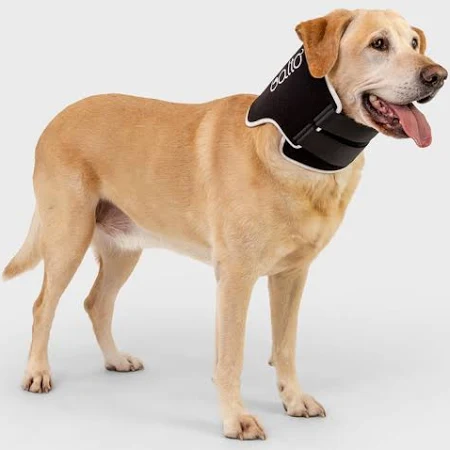
Recovery Suits:
Recovery suits are like dog clothes, available in different sizes to fit every dog type. They are made of soft and comfortable cloth covering the wounded part of the body so your dog cannot lick it repeatedly. The most significant advantage of recovery suits is that they are washable, so you don’t have to buy them repeatedly. These suits have no head restriction, so your dog can walk comfortably wherever it wants.

Soft Collars:
Soft collars are also a good choice for dog owners who want to stop their dogs from licking. It is very soft, padded, comfortable, and durable. It comes in various sizes, so you can select the best size according to your dog’s measurements. Soft collars are far better than regular cones, which are not very deep and breathable.
So your dog will not get irritated while wearing it. Apart from being comfortable, the soft collars are perfect in their function. They restrict the dog’s head movement and prevent it from reaching the wound and licking it. So, if you want to make this choice, just go forward!

DIY Collars:
If you think that collars will work best for keeping your dog away from licking its wound, but on the other hand, if you do not want to go with uncomfortable collars, you can make a DIY collar at home. You can use any comfortable material at home and make a beautiful dog collar by following video tutorials on YouTube.
The benefit of making a DIY collar at home is that it will be very comfortable. Secondly, you can make it of your dog’s exact size and personalize it according to your choice.
Elastic Bandages or Tubular Bandages:
Using elastic bandages, tubular bandages, or any other kind is also an option for dog owners. As discussed above, bandages will cover the wound, not let your dog lick it, and help prevent infections. There are a variety of dog bandages available in pharmacies which you can buy.
Bite-Not Collars:
Another alternative to cones is bite-not collars. These are specially designed to keep wounded dogs away from licking the wounds. Their design does not let the dog reach the wounded area without redistricting its movements for eating or drinking. So it will provide comfort along with protection from licking the wound.

Surgical Socks or Leggings (If the wound is in the leg area):
Generally, dogs get wounds on the legs. You can use surgical socks or leggings if your dog is one of them. These are easy to put on and comfortable for your dog. It will not restrict your dog from any type of movement but just will cover the wounded or infected area to hide it away from your dog. Thus, your dog can enjoy its free movement but won’t be able to lick its wound repeatedly.

How To Heal A Dog Wound Fast
If your dog is wounded, taking care of it properly is essential. If these wounds are minor cuts and bruises, you can quickly care for them at home. But in case of profound or severe injuries, getting professional help is essential.

The following must be considered for caring for wounds and helping them heal faster.
Clean the Wound:
If you want the wound to heal quickly, it must be free from infections and germs. If the wound is not kept clean, it will never heal but worsen. So, if you notice any wound on your dog, clean it with an antiseptic. Also, clean it twice a day until the damage has healed entirely.
Apply Topical Medication:
After thoroughly cleaning the wound, the next step is to consult any vet and ask him for any medication you can apply to the damage to speed up the healing process. There are many topical medications available that can help to treat the wound. Try to choose medication that does not have a foul odor so your dog won’t feel uncomfortable.
Keep the Wound Dry:
Bacteria and infections love moist places, so never leave the wound wet, or it will soon become infected. So always ensure the wound is dry and no liquid is found on that wound. You can use a paper towel to dry the wound and gently dab it on the wound. Never rub the wound, or it will worsen the wound.
Minimize Licking:
As we are talking from the start of our article, the most important thing to let the wound heal properly is to stop your dog from licking the wound. You can minimize licking in many ways, and this has been discussed in detail before.
Follow Veterinarian’s Instructions:
Even though you are taking proper care of your dog’s wound at home, getting it checked by someone professional at least once is essential to ensure there is no infection or severe issue. Also, ensure to understand the instructions given by the vet properly and follow them strictly. Dogs cannot take care of themselves, so it is up to your care how fast its wound will heal, and your little friend can become active again.
Provide a Balanced Diet:
Apart from healing the external wound, you must ensure your dog gets enough energy to recover after a traumatic accident. Its body needs nutrients, which you must provide through a healthy and balanced diet. Take special care of your pet’s diet while it is injured. Give it food timely and add all healthy things to it, which can revive your dog’s energy.
Avoid Irritation:
An injured dog may be depressed and irritated all the time, so you have to take good care of its comfort. Try not to put on anything that can be uncomfortable for your dog or can irritate it. You should cheer your little friend as much as possible by cuddling, playing, or giving it attention. It will make him forget his wound within a few days.
Regular Vet Checkups:
Remember to check your dog occasionally until the wound is fully healed. This will help you in preventing any mishaps. Also, professionals can judge the wound better than us, so we might miss something a professional can catch. So, always go to vets and follow their instructions, as they are essential if you want good health for your dog.
Avoid Over-the-Counter Treatments:
Many of us think we are doctors and know which medicine to use in case of any injury or sickness. But never do that. Over-the-counter treatments can sometimes prove very dangerous for your dogs. Applying medication without consulting a vet can lead to worsening the wound. So always use prescribed medicines.
Avoid Excessive Manipulation:
Even though you want your dog’s wound to heal fast, don’t haste too much and give it the necessary time to heal. Avoid using too many medications as it can also lead to infections or severe wounds. Wounds need a particular time to heal; you cannot shorten that period. So be patient and let the wound take its time.
Why Do Dogs Lick Their Wound?
Like humans try to care for our wounds, animals have the same instinct to treat their wounds. They do this by licking as it keeps their damage clean, and their saliva has some antibacterial properties that help the wound heal quickly. Another reason for licking is that the rubbing sensation produced by licking the wound blocks their pain, reducing their pain.

While your dog’s intention in licking its wound is just to take care of its wound, if that licking becomes too much, it might worsen it. That is why it is imperative to stop them from licking the wound.
Common Question:
Can dogs heal by licking?
Yes! Dogs can get healed by licking their wounds. Many stray dogs use just licking to heal their wounds but too much licking can result in infections and worsening the wound.
Can I put aloe vera on my dog?
Yes, applying aloe Vera on open wounds and cuts can help injuries heal quickly, but make sure your dog does not ingest it as it is unsafe.
What ointment is safe for dogs?
‘Neosporin’ is a widely used antibiotic for dog wounds. It is a mild ointment that can be applied to any wound.
Can I put olive oil on my dog?
Applying olive oil directly on a dog’s open skin is not advisable by many vets. This is because olive oil has anti-inflammatory properties and thus can delay healing. Also, it can cause skin irritation and a messy situation around the wound.
Can you put Vaseline on a dog’s open wound?
Applying Vaseline does not have any profound effect on a dog’s wound. However, many vets do not recommend it as it creates a layer over your wound and can delay healing. So, if you want to apply Vaseline, you must consult your vet first.
Can I put coconut oil on my dog?
Coconut oil is a good and safe choice for treating dog wounds. It has natural antibacterial, antiviral, and antifungal properties that help to speed up the healing process.
Is Dettol okay for dogs?
No, never use Dettol on your dogs or any pet. Dettol has an active ingredient named ‘Chloroxylenol,’ which is very toxic to animals if ingested or even in contact with animals.
Do dogs’ tongues heal quickly?
Dog’s tongues and other areas in the oral cavity are more likely to heal quickly due to the environment of the oral cavity. Dog saliva contains antibacterial properties that help in healing. Thus, you don’t have to worry about wounds or cuts on the tongue, as they will heal soon.
End Note:
I hope you have learned enough ways on how to stop dog licking without collar. Whatever method you use, make sure not to get too strict on your dog. Also, keep a good check on it and give your pet much love and care.
If your dog needs to get in control and a method is working on it, ask your vet for some suggestions. He will either tell you some medicines to treat the wounds well and quickly and control the dog’s behavior, or he will advise you on other creative ways to stop your dog from licking the wound.
